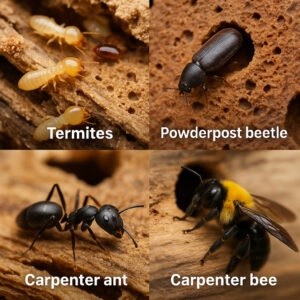New Jersey’s humid climate and dense suburban development make it a prime target for wood-destroying insects. These pests are more than a nuisance—they can cause thousands of dollars in structural damage to homes if left untreated. Knowing which insects pose the biggest threat can help homeowners take proactive steps to protect their property.
1. Termites
The Silent Destroyers
Eastern subterranean termites are the most destructive wood-destroying insects in New Jersey. Operating silently and often undetected, they feed on cellulose found in wood, flooring, and even wallpaper. A single colony can contain hundreds of thousands of termites, and over time, they can severely weaken the structural integrity of a home.
Damage Potential:
-
Annual U.S. damage cost: $5 billion
-
Average homeowner repair costs: $3,000–$8,000+
-
Signs include mud tubes, hollow-sounding wood, or swarming in spring.
2. Carpenter Ants
Excavators of Wood
Unlike termites, carpenter ants do not eat wood but tunnel through it to build their nests. They prefer damp, decaying wood and often infest areas such as window frames, roof eaves, and wall voids.
Damage Potential:
-
Annual U.S. damage estimate: $100–$250 million
-
Typical repair costs: $500–$5,000+
-
Look for piles of sawdust (frass), rustling sounds in walls, and winged ants indoors.
3. Carpenter Bees
Buzzing Builders
Carpenter bees resemble bumblebees but are solitary and bore perfectly round holes into exposed wood. Over time, their nesting habits can weaken support beams, railings, and trim—especially in decks, porches, and fascia boards.
Damage Potential:
-
Typically cosmetic at first, but repeated infestations lead to rot and decay
-
Attracts woodpeckers, which cause additional destruction by digging out larvae
4. Powderpost Beetles
Tiny Beetles, Big Damage
These beetles lay eggs in cracks of hardwood. When the larvae hatch, they burrow and feed within the wood for months or even years before emerging, leaving tiny exit holes and a powdery residue.
Damage Potential:
-
Often affects floors, furniture, and support beams
-
Can be hard to detect until significant damage has occurred
-
Requires fumigation or replacement in severe cases
Protecting Your Home from Wood-Destroying Insects
Early detection and prevention are key. Homeowners should:
-
Schedule annual pest inspections
-
Eliminate moisture issues
-
Seal cracks and crevices around the home
-
Keep firewood and mulch away from the foundation
🛡️ Professional Help is Key
At Action Termite and Pest Control, we offer expert inspections, proven treatment plans, and long-term protection against all major wood-destroying insects in New Jersey. Don’t wait until damage becomes visible—protect your investment today.
📞 Call 800-920-0906 or visit www.actionpestcontrol.com to schedule an inspection.



